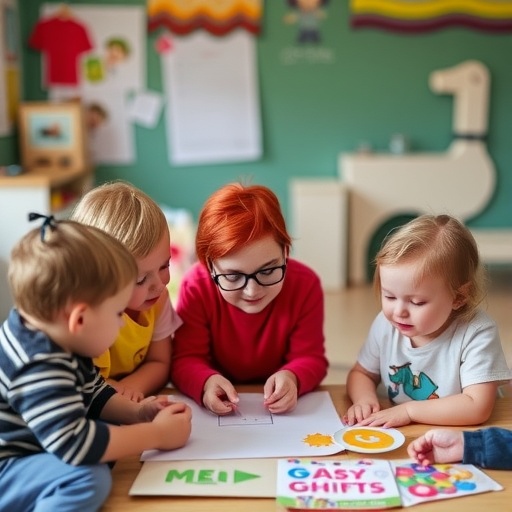In recent years, the landscape of early childhood intervention services has transformed significantly, particularly in Croatia. Grounded in rigorous research and hands-on experiences, effective practices in this domain not only enhance the capabilities of educators and practitioners but also significantly uplift the developmental trajectories of young children facing various challenges. This evolution is the focal point of a noteworthy study conducted by researchers T. Čivrag, S. Alimović, and N. Lisak Šegota, who meticulously analyzed the intricacies of Croatian Early Childhood Intervention Services to derive valuable insights from their practical implementation.
The researchers embarked on an extensive investigation aimed at understanding how early childhood intervention (ECI) services can be optimized for effectiveness. Through a combination of qualitative and quantitative methods, they meticulously detailed how these services could be structured to not only address immediate developmental issues but also build a sustainable support framework for affected families. The findings presented in their research reflect a coalition of theoretical knowledge and empirical data, showcasing the importance of collaboration among multi-disciplinary teams that include health professionals, educators, and family members.
A central theme emerging from the study is the significance of an individualized approach to intervention. It is emphasized that no two children are alike, and interventions must be tailored to meet the unique needs of each child. This individualized model is coupled with the necessity for ongoing assessments to monitor progress and adjust strategies accordingly. This fluidity in intervention practices allows for a more dynamic response to the evolving needs of children, facilitating better outcomes over time.
Additionally, the study captures the importance of parent engagement in the early intervention process. The researchers highlighted a growing body of evidence that suggests when parents are actively involved in their children’s learning and intervention strategies, the results tend to be more positive. This collaboration empowers parents, providing them with tools to support their child’s development at home, thereby extending the benefits of formal intervention beyond institutional settings.
The implementation of training programs for practitioners is another critical aspect underscored by the research. The findings indicate that ongoing professional development not only equips educators and caregivers with current methodologies but also fosters a culture of reflective practice. This training is vital in ensuring that practitioners are well-versed in the latest research findings and are capable of translating theoretical concepts into practical applications within the classroom setting.
Moreover, the authors examined the systemic challenges that often hinder the efficacy of early childhood interventions. They pointed out that bureaucratic hurdles and a lack of sufficient resources can often stifle creativity and limit flexibility in providing tailored interventions. The study calls for policymakers to prioritize resource allocation toward ECI, advocating for an investment in both human and material resources to elevate the quality of early interventions.
Importantly, the research sheds light on the role of technology in enhancing early childhood intervention practices. The authors discussed the ways in which digital tools can be harnessed to facilitate communication between parents and service providers, track developmental milestones, and offer virtual intervention options. These innovations have the potential to bridge gaps in service delivery, especially in underserved areas, thus ensuring that all children have access to necessary resources.
Throughout the research, the authors utilized case studies that represented a range of different scenarios encountered within Croatian ECI services. These real-world examples added depth to their findings, portraying a vivid picture of both successful strategies and the barriers that still exist. The narratives within these case studies provide a compelling argument for the need to adapt and evolve intervention strategies in accordance with actual experiences on the ground.
The findings from this investigation not only contribute to the existing body of literature on early childhood intervention but also position Croatia as an exemplar in the global conversation surrounding best practices. By effectively implementing evidence-based strategies that prioritize the needs of children and families, Croatia is setting the stage for more comprehensive and impactful early intervention services. Such an approach could very well serve as a model for countries seeking to enhance their own ECI frameworks.
In conclusion, the work of Čivrag, Alimović, and Lisak Šegota underscores the nuanced and multifaceted approach required in early childhood intervention. Their research advocates for personalization in service delivery, empowering parental engagement, ongoing professional development for practitioners, the integration of technological solutions, and systemic reform to enable more effective practices. Each of these elements plays a pivotal role in ensuring that young children, regardless of their individual challenges, can thrive in a supportive and nurturing environment.
The findings lay the groundwork for future research and the establishment of best practices that could benefit not only Croatian children but also inform international strategies in early childhood education. As the field of early intervention continues to evolve, the lessons learned from Croatia’s experiences will undoubtedly contribute to the continual improvement of services aimed at supporting the development and well-being of young children.
With an eye on the future, it is crucial for all stakeholders—including educators, healthcare providers, policymakers, and families—to remain engaged in dialogue concerning effective practices. Flexibility and responsiveness to new research findings and evolving needs will be essential as Croatia and other nations strive to refine their early childhood intervention services and provide optimal support to every child in need.
Subject of Research: Effective practices in Croatian early childhood intervention services.
Article Title: Effective Practices in the Croatian Early Childhood Intervention Service: What Have We Learnt from its Implementation?
Article References: Čivrag, T., Alimović, S. & Lisak Šegota, N. Effective Practices in the Croatian Early Childhood Intervention Service: What Have We Learnt from its Implementation? Early Childhood Educ J (2025). https://doi.org/10.1007/s10643-025-01913-y
Image Credits: AI Generated
DOI:
Keywords: Early Childhood Intervention, Individualized Approach, Parent Engagement, Professional Development, Technology in Education, Systemic Challenges, Best Practices.




